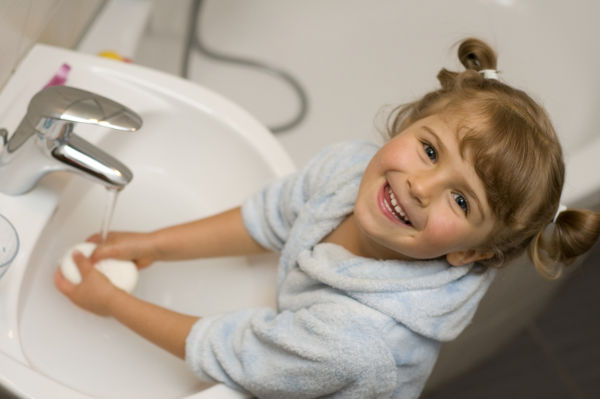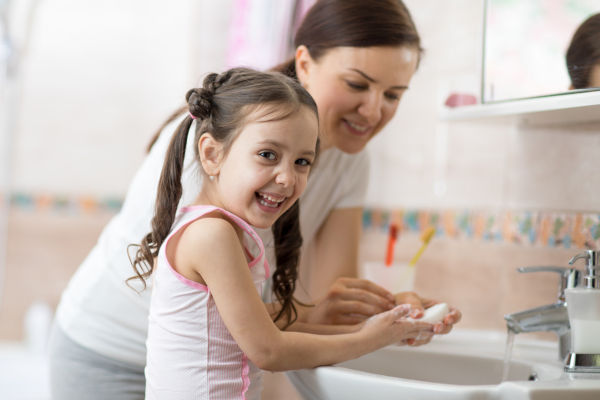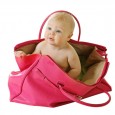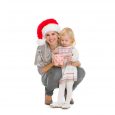As coronavirus spreads across the world and establishes a foothold here in the UK, the NHS is urging everyone to wash their hands. Research has shown that just by regularly washing our hands with soap and water can reduce the spread of respiratory infections by 20%.
Coronavirus, like many other viruses, is able to infect a person by entering the body through the mouth, nose, and eyes. The virus is spread when molecules of bodily fluids are released through sneezing and coughing. These land on surfaces and are then picked up on people’s hands through touch, and enter the body when we touch our faces or use our hands to eat food.
That’s why hand washing, and avoiding touching our faces, is crucial to curb the spread of coronavirus and it could be the difference between a terrible pandemic and a harsher than usual flu season.
Why Is Handwashing In Children Important?

As adults, we’re acutely aware of the need to wash our hands to help reduce the spread of germs and for many of us it’s an ingrained habit that has become an automatic reflex. However, children, AKA germ super spreaders, need more encouragement.
Children in the UK receive a flu vaccination because it’s recognised that they have an amazing ability to spread viruses around like wildfire. If you have ever spent time in a school setting you can easily see why. They huddle together with little regard for personal space, constantly touch one another, and when they are ill they use their hands to wipe snot away and fail to cover their mouths when coughing.
The good news for children with regards to the current outbreak of Coronavirus, AKA Covid19, is that children who do contract it seem to only have mild symptoms or be asymptomatic. However, reducing the spread of the disease will be essential to ensure that groups that are vulnerable to the infection (the over 60s and those with chronic conditions, such as diabetes, heart conditions, etc) are kept safe.
For this reason, it’s a good idea to encourage good handwashing and hygiene techniques with your child.
Tips For Getting Your Child To Wash Their Hands

The NHS recommends that you should wash your hands for around 20 seconds (roughly the time it takes to sing “Happy Birthday” twice) before and after preparing food, before eating, after going to the toilet, after blowing your nose or coughing, after treating a cut, and after handling animals.
You can encourage your child to wash their hands thoroughly in the following ways:
Use A Hand Wash Song
You could sing happy birthday twice or use your own version. Here at Mumblog, we’re a fan of the “Wash Your Dirty Hands” song that we believe may have originated from the Fun Song Factory, a children’s TV show from the late 90s and is sung to the same tune as “Jelly on plate”.
Wash your dirty hands!
Wash your dirty hands!
With a rub-a-dub dub, and a rub-a-dub-scrub, wash your dirty hands!
You will need to sing it twice to get around 20 seconds of handwashing time.
Use Fun Soap
Making handwashing fun is a great way of encouraging children to spend more time at the sink. You could purchase fun soap, such as foaming soap or themed solid soap bars, or even a unicorn themed soap.
Alternatively, make your own fun soap using a melt and pour soap base, a few drops of essential oils, and place a small plastic toy, such as a dinosaur, in the mould for children to try and get to as they wash their hands.
Make It Visual
Talk to your child in an age appropriate way about how germs on our hands can make us sick, and how it’s important to wash their hands properly. Then give them a visual demonstration by covering their hands in glitter. Ask them to see how long it takes them to wash off every single speck and explain how germs are much smaller and impossible to see, so it’s important to wash hands thoroughly to be sure that they have been washed away.
Lead By Example
Make sure your child sees you regularly washing your hands. Before meals, make it a family trip to the sink so that everyone washes their hands together. Children learn best through watching the actions of their parents so by setting this example you are teaching them what is expected.
Use A Reward Chart
This works best for younger children who are easily pleased with a sticker. Using a reward chart for good handwashing will hopefully make it more of a habit with your child.
Make It A Game
Make handwashing more appealing by making it fun. Invite your child to wash one of their favourite toys (not a cuddly one or one with batteries), such as a toy car, dinosaur, or Lego Minifigure. Their hands will get clean in the progress. Alternatively, tell your child that the soap gives them superpowers, or even just let them make a mess with lots of soapy water.
Reward Handwashing At School
Although we can control handwashing at home to some extent, at school it’s a bit trickier. You may want to talk to your child’s teacher about how they are promoting hand hygiene in school, but you could also offer your child a reward for washing their hands at school. You could even put a dot on their hand with a pen at the start of the day and ask your child to wash it off whist they are at school.
Using Hand Sanitiser
Hand sanitiser should only be used when soap and water isn’t available. What’s more, hand sanitiser that contains less than 70% alcohol is not effective against the current outbreak of coronavirus / covid19.
However, hand sanitiser is useful when out and about, such as a trip to the park, or when using public toilets where no soap is available, so it’s worth carrying a bottle in your bag. You could also talk to your child’s school to ask if your child is able to have a bottle with them, perhaps in their lunch box to encourage them to clean their hands before eating, especially if the school does not have a hand-washing routine built into the day.




